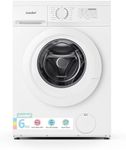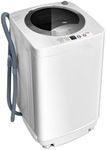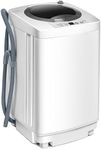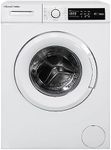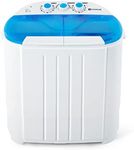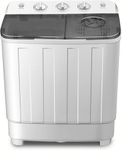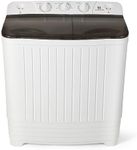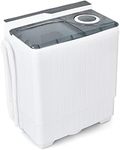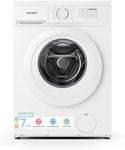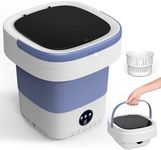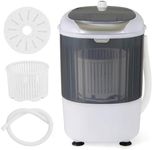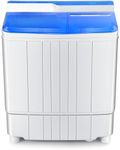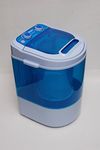Buying Guide for the Best Portable Washing Machines
Choosing the right portable washing machine can make a big difference in your laundry routine, especially if you live in a small space or need a convenient solution for washing clothes. To find the best fit for you, it's important to understand the key specifications and how they align with your needs. Here are the main factors to consider when selecting a portable washing machine.CapacityCapacity refers to the amount of laundry the machine can handle in one cycle, usually measured in pounds or kilograms. This is important because it determines how much laundry you can wash at once. Smaller capacities (around 5-7 lbs) are suitable for individuals or couples with minimal laundry needs, while larger capacities (10-15 lbs) are better for families or those who need to wash larger items like bedding. Consider your typical laundry load size to choose the right capacity for you.
DimensionsThe dimensions of a portable washing machine indicate its physical size, which is crucial for ensuring it fits in your available space. Measure the area where you plan to place the machine, including any storage space if you plan to tuck it away when not in use. Compact models are ideal for small apartments or dorm rooms, while slightly larger models can fit in more spacious areas like a laundry room or bathroom.
WeightWeight is an important factor if you need to move the washing machine frequently. Lighter models (under 50 lbs) are easier to transport and store, making them ideal for those who need to move the machine in and out of storage. Heavier models may offer more stability and durability but can be more challenging to move around. Consider how often you will need to relocate the machine to determine the best weight for your needs.
Power SourcePortable washing machines can be powered by electricity or manually. Electric models are more convenient and offer various wash cycles and features, but they require access to an electrical outlet. Manual models, which you operate by hand or foot, are useful in situations where electricity is not available, such as camping or off-grid living. Choose based on your access to power and your preference for convenience versus portability.
Wash Cycles and SettingsWash cycles and settings refer to the different modes and options available for washing your clothes. Basic models may have just a few settings, such as normal and gentle, while more advanced models offer a range of cycles for different fabrics and soil levels. Consider your laundry habits and the types of clothes you wash most often. If you need specific cycles for delicates, heavy-duty items, or quick washes, look for a machine with those options.
Water UsageWater usage indicates how much water the machine uses per cycle. This is important for both environmental and practical reasons, especially if you have limited water access or want to reduce your water bill. Models with lower water usage are more efficient and eco-friendly. Check the specifications for water consumption and consider how it aligns with your water availability and conservation goals.
Noise LevelNoise level refers to how loud the machine is during operation. This can be a significant factor if you live in a small space or have close neighbors. Quieter models are preferable for apartments or shared living situations. Look for machines with noise-reducing features or check user reviews for feedback on noise levels to find a model that won't disturb your household.
Ease of UseEase of use encompasses how simple the machine is to operate, including loading and unloading clothes, setting wash cycles, and maintaining the machine. User-friendly controls, clear instructions, and easy maintenance features like removable lint filters can make a big difference in your overall experience. Consider your comfort level with operating appliances and look for a model that matches your preference for simplicity or advanced features.
